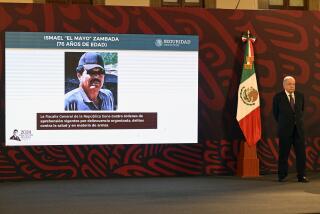Mexican Officials Link U.S. Currency Exchange to Swindle
Seven men will appear today before a judge in Tijuana after being arrested over the weekend as suspects in an intricate $34-million currency fraud scheme.
Mexican officials said in a press conference Tuesday they would also seek the extradition of several U.S. citizens and Mexican nationals living in the United States who are believed to have been involved in the scam against the Mexican government and several branches of nationalized banks in Tijuana and Mexicali.
The requests for extradition will not be completed for several weeks, the officials said, and it could be months before officials in the U.S. decide whether they will be honored. Those arrested in Mexico will be charged with fraud, bribery and falsification of documents.
Prosecutors Jose Franco Villa and Jaime Torres Espinosa said the suspects in this case might constitute only one of a number of rings perpetrating similar currency fraud schemes. Their investigation will encompass each of the more than 20 branches of nationalized banks in Tijuana and Mexicali.
Franco and Torres said the seven men arrested last weekend, including banking and customs officials, are charged with improperly taking advantage of a provision that allows Mexican businesses that must purchase goods in the United States to exchange pesos for dollars at a preferential rate.
The currency exchanges are by law to be made only for the purchase of American goods not manufactured in Mexico. The seven men allegedly participated in a scheme to obtaining the American currency at the preferential rate for about 215 pesos per dollar, then selling those dollars at a San Ysidro currency exchange for about 245 pesos per dollar, the current market rate.
Mexican authorities believe the seven men, with the aid of several persons working on the U.S. side of the border, bought and sold at least $34 million since February of this year, illegally retaining a profit of 30 pesos for each dollar or more than $4 million.
Franco and Torres said the ring allegedly created two phony corporations, named Globe International and CNC Sales International, and claimed they were purchasing agricultural equipment from the firms.
The members of the ring will be charged with cashing the checks in San Ysidro and pocketing the 30-peso per dollar profit rather than purchasing equipment with the dollars obtained at the preferential rate,
Pietro La Greca, owner of the P.L. Money Exchange in San Ysidro, on Tuesday wrote an open letter in several Tijuana newspapers denouncing as corrupt the local federal investigation that preceded the arrests. La Greca’s father-in-law, Fernando Gutierrez Moreno, was among those arrested last weekend in Tijuana.
Attempts to reach La Greca at the money exchange were unsuccessful.
Mexican officials have refused to name the persons they hope to have extradited from the United States, although they have confirmed that the suspects were involved with a San Ysidro currency exchange business that allegedly participated in the scam.
Gutierrez owned a private import-export firm that completed the bank paper work confirming that the equipment could not be purchased in Mexico, prosecutors allege. Francisco Casas Garcia, a representative with the Gutierrez Agency, was also arrested last weekend.
Also arrested were Mario Alberto Lopez, Ramiro Marquez Martinez and Juan Jose Martinez, all managers of bank branches in Tijuana; David Castro Sanchez, a Mexican customs official who was responsible for ensuring that the goods for which the preferential exchange rate was obtained were actually purchased, and Roberto Medina, a Mexicali resident.
The men were transfered from a federal prison to the municipal jail in Tijuana on Tuesday.
Mexican authorities said the government’s four-year-old dual exchange program, designed to aid companies which must purchase certain goods outside Mexico, would be suspended in many Baja California banks until the investigation is completed.
More to Read
Sign up for Essential California
The most important California stories and recommendations in your inbox every morning.
You may occasionally receive promotional content from the Los Angeles Times.










